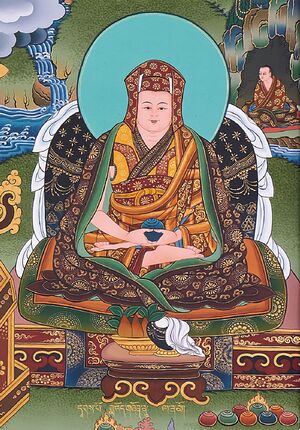No edit summary |
No edit summary |
||
| Line 4: | Line 4: | ||
|blogTitle=Gompopa and His ''Jewel Ornament of Liberation'' | |blogTitle=Gompopa and His ''Jewel Ornament of Liberation'' | ||
|blogImage=File:Dakpo_Dawo.jpg | |blogImage=File:Dakpo_Dawo.jpg | ||
|blogContent=[[Texts/Dam_chos_yid_bzhin_gyi_nor_bu_thar_pa_rin_po_che%27i_rgyan | ''Dam chos yid bzhin nor bu thar pa rin po che'i rgyan'']] or ''Dvags po thar rgyan'' | |blogContent=[[Texts/Dam_chos_yid_bzhin_gyi_nor_bu_thar_pa_rin_po_che%27i_rgyan | ''Dam chos yid bzhin nor bu thar pa rin po che'i rgyan'']], or ''Dvags po thar rgyan'' for short, is one of the most popular works by [[People/Sgam_po_pa | Gampopa Sonam Rinchen]], one of the founding fathers of the Kagyu tradition. Using a lam rim instructional style, the text presents the entire system of the Buddhist spiritual practice using the framework of the six focal points of cause, support, agent, technique, result, and actions. | ||
:རྒྱུ་ནི་བདེ་གཤེགས་སྙིང་པོ་སྟེ། ། | :རྒྱུ་ནི་བདེ་གཤེགས་སྙིང་པོ་སྟེ། ། | ||
:རྟེན་ནི་མི་ལུས་རིན་ཆེན་མཆོག ། | :རྟེན་ནི་མི་ལུས་རིན་ཆེན་མཆོག ། | ||
| Line 18: | Line 18: | ||
:Who engages in actions for the world with no thought. | :Who engages in actions for the world with no thought. | ||
Gampopa, thus, set the ground with buddha-nature as the cause of enlightenment. He goes on to | Gampopa, thus, set the ground with buddha-nature as the cause of enlightenment. He goes on to elaborate how buddha-nature exists in all sentient beings as the capacity for enlightenment, citing sūtra sources and using the three arguments presented in the ''Sublime Continuum'' [[Texts/Ratnagotravibhāga_Mahāyānottaratantraśāstra/Root_Verses/Verse_I.28 | Verse I.28.]] | ||
The text is also available in English translations such as [[Books/The_Jewel_Ornament_of_Liberation_(Guenther) | ''Jewel Ornament of Liberation'']] by [[People/Guenther,_H. | Herbert Guenther]]. | The text is also available in English translations such as [[Books/The_Jewel_Ornament_of_Liberation_(Guenther) | ''Jewel Ornament of Liberation'']] by [[People/Guenther,_H. | Herbert Guenther]]. | ||
|WkQtContent=Why wouldn’t one attain enlightenment if sought with diligence because all of us sentient beings possess buddha-nature, the cause of buddhahood. | |WkQtContent=Why wouldn’t one attain enlightenment if sought with diligence because all of us sentient beings possess buddha-nature, the cause of buddhahood. | ||
|WkQtSource=Gampopa Sonam Rinchen | |WkQtSource=Gampopa Sonam Rinchen | ||
}} | }} | ||
Revision as of 13:08, 23 February 2021
Gompopa and His Jewel Ornament of Liberation[edit]
Dam chos yid bzhin nor bu thar pa rin po che'i rgyan, or Dvags po thar rgyan for short, is one of the most popular works by Gampopa Sonam Rinchen, one of the founding fathers of the Kagyu tradition. Using a lam rim instructional style, the text presents the entire system of the Buddhist spiritual practice using the framework of the six focal points of cause, support, agent, technique, result, and actions.
- རྒྱུ་ནི་བདེ་གཤེགས་སྙིང་པོ་སྟེ། །
- རྟེན་ནི་མི་ལུས་རིན་ཆེན་མཆོག །
- རྐྱེན་ནི་དགེ་བའི་བཤེས་གཉེན་ཡིན། །
- ཐབས་ནི་དེ་ཡི་གདམས་ངག་སྟེ། །
- འབྲས་བུ་རྫོགས་སངས་རྒྱས་ཀྱི་སྐུ། །
- ཕྲིན་ལས་རྟོག་མེད་འགྲོ་དོན་མཛད། །
- The buddha-nature is the cause,
- Precious and supreme human body, the support,
- The virtuous master is the agent,
- And his instructions, the expedient technique.
- The result is the body of the perfect Buddha,
- Who engages in actions for the world with no thought.
Gampopa, thus, set the ground with buddha-nature as the cause of enlightenment. He goes on to elaborate how buddha-nature exists in all sentient beings as the capacity for enlightenment, citing sūtra sources and using the three arguments presented in the Sublime Continuum Verse I.28. The text is also available in English translations such as Jewel Ornament of Liberation by Herbert Guenther.
Weekly quote[edit]
Why wouldn’t one attain enlightenment if sought with diligence because all of us sentient beings possess buddha-nature, the cause of buddhahood.~ Gampopa Sonam Rinchen

